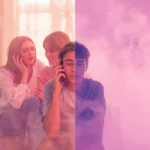Table of Contents
There’s a moment after a breakup when the silence feels heavier than the loss itself. You sit with your thoughts, scrolling through old messages, or lying awake replaying what-ifs. In that quiet ache, a question often surfaces: Do I just need someone to listen—or do I need real help? This is where the choice between therapy vs friendship after a breakup becomes deeply personal. Both can help, but in very different ways.
When a Friend is Enough

Sometimes the simplest medicine is presence. A friend who answers your late-night text, who reminds you to eat, or who sits with you while you cry without trying to fix it.
Research shows that this kind of social support acts like a buffer, softening the blow of heartbreak. Having someone close reminds your nervous system that you are not alone, that life is still threaded with connection even when love is gone.
If your pain feels heavy but not overwhelming—if you can still work, still laugh sometimes, still move through your days—then friends may be enough to help you find your footing in those first raw weeks. Their empathy becomes the scaffolding while your heart begins to rebuild.
When Therapy is the Better Path

But sometimes heartbreak doesn’t just sting—it hijacks. You can’t stop replaying conversations. You avoid places or people that remind you of your ex. Or you feel trapped in loops of rumination that keep you from sleeping, eating, or focusing.
When distress lingers like this, friendship may not reach the depth of what you’re going through.
Therapists offer what friends cannot:
- Structure and coping tools
- A safe container for complex grief
- Guidance to reframe thought patterns
- Help in navigating hidden wounds or insecurities
In the balance of therapy vs friendship after a breakup, therapy often becomes the stronger ally when pain refuses to loosen its grip.

Coping with the First Month After a Breakup
Let’s examine coping with the first month after a breakup in: Shock, Panic & implosion, Managing Daily Overwhelm (Survival Mode), The No-Contact Gauntlet, Emotional Outbursts – Rage, Crying & “What Is Wrong With Me” Moments, Coping Alone vs Reaching Out and Your First Glimpse of Hope
Tap here to read more →The Middle Ground
Between the two, there’s a bridge. Group therapy, online communities, even the simple act of writing about your story can create a sense of shared healing.
Studies show that these kinds of peer-supported structures reduce distress and provide relief, often blending the best of both worlds:
- The empathy of others who’ve been there
- The guidance of a shared process
Sometimes, the middle path is enough to remind you that your story is not isolated—that heartbreak is a universal human thread, and in speaking it aloud or writing it down, its weight begins to shift.
A Gentle Reflection
So, do you need therapy, or just a good friend?
The truth is, you don’t have to decide once and for all. You may start with a friend, and later need therapy. Or you may begin in therapy and lean more into friendship as you heal.
Heartbreak doesn’t demand a single answer—it asks you to listen. To notice whether your pain feels lighter after talking with someone, or whether it lingers and deepens despite your efforts.
Either way:
- You are not weak for needing more than friendship.
- You are not broken for healing with it alone.
You are simply human, finding the support that helps your heart steady itself again.
FAQ
FAQ
Q1. How do I know if I need therapy after a breakup or if a friend is enough?
If your sadness is easing with time and you feel supported by friends, you may not need therapy right away. But if your thoughts feel stuck, your daily life is disrupted, or the pain lingers, therapy can provide structured tools and healing beyond what friendship alone offers.
Q2. Can friends really help me heal after a breakup?
Yes, friends play a powerful role in the healing process. Research shows that social support acts like a buffer, reducing distress and helping you feel less isolated during heartbreak.
Q3. What is the difference between therapy and friendship support after a breakup?
Friendship offers empathy, presence, and connection, while therapy provides professional guidance, coping strategies, and a safe space to process deeper emotions. The choice between therapy vs friendship after a breakup depends on the depth of your pain and how it affects your daily life.
Q4. Is there a middle option between therapy and just talking to friends?
Absolutely. Options like support groups, online communities, or expressive writing combine the benefits of shared empathy with structured healing. These approaches can be a helpful bridge if you’re not ready for one-on-one therapy but need more than casual support.
Scientific Sources
-
Q. Wang et al. (2024): Is social support beneficial after a breakup? A moderation…
Key Finding: Social support serves as a coping resource that helps alleviate the negative mental health effects of breakups, particularly during concurrent stress such as the COVID-19 pandemic.
Why Relevant: Demonstrates the buffering role of social support in reducing emotional distress following relationship dissolution.
https://journals.sagepub.com/doi/10.1177/02654075231226377 -
Tiffany Field (2023): Romantic breakup distress: a narrative review
Key Finding: Interventions such as writing or ‘storying’ about heartbreak and participation in Internet group therapy have been shown to reduce distress and foster adjustment after breakups.
Why Relevant: Offers insight into structured, therapeutic-style interventions—including peer-supported group formats—that support healing beyond informal friendship.
https://medcraveonline.com/JPCPY/romantic-breakup-distress-a-narrative-review.html -
Mancone, Celia, Bellizzi, Zanon & Diotaiuti (2025): Emotional and cognitive responses to romantic breakups
Key Finding: Rumination strongly predicts negative outcomes, and avoidance coping further mediates emotional distress. Conversely, adaptive coping—including social support, positive attitude, and problem-solving—is linked to better post-breakup adjustment.
Why Relevant: Highlights how informal social support and proactive coping strategies are crucial predictors of healthier recovery trajectories.
https://pmc.ncbi.nlm.nih.gov/articles/PMC11985774/
- How to Set Healthy Boundaries After a Breakup: Essential Ways to Still Get Support

- Online Breakup Support That Actually Heals: Can Forums Really Help You Move On?

- Toxic Positivity Exposed: Why It Hurts More Than It Helps After a Breakup

- Avoiding the Drama Triangle: Powerful Ways to Escape Gossip, Enabling & Toxic Support

- The Ultimate Breakup Buddy System: 5 Positive Ways to Heal Without Backfiring

- Therapy vs Friendship After a Breakup: The Healing Choice You Need to Make

- Why Asking for Help After a Breakup Feels Impossible (And How to Finally Do It)

- The “I Don’t Want to Bother Anyone” Lie: The Truth About Coping After a Breakup

- Who to Call After a Breakup: Healing Support & Painful Voices to Avoid


Leave a Reply